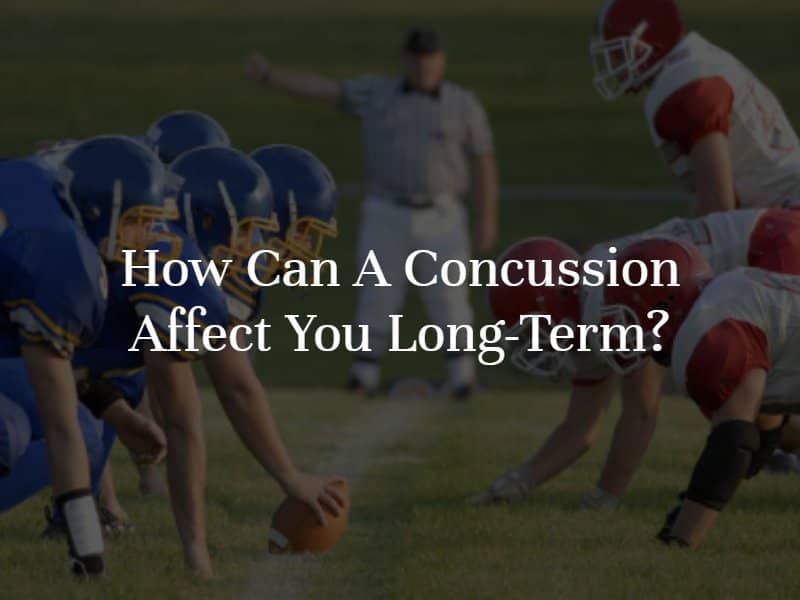A concussion is a type of traumatic brain injury (TBI) caused by a violent jolt or a blow to the head, causing the brain to shake back and forth. As a result, the brain’s nerve fibers are damaged, interrupting normal brain activities. Concussions are severe injuries that victims often suffer in personal injury accidents, but many are unaware of the potential long-term effects.

How Can a Concussion Affect You Long-Term?
Concussions are typically thought of as mild traumatic brain injury (TBI) and are not life-threatening in most cases. However, many people do not know that there can be long-term effects that do not resolve within a few weeks, like most symptoms. One chronic condition that a victim may suffer is called post-concussion syndrome.
Even a mild concussion can cause post-concussion syndrome, resulting in symptoms lasting for weeks or even months after the initial injury. Symptoms of post-concussion syndrome can include:
- Headaches
- Disorientation
- Fatigue
- Ringing in the ears
- Increased irritability
- Depression, anxiety, and other mental health conditions
- Insomnia
- Loss of concentration and memory
- Blurry vision
- Sensitivity to noise and light
- Changed senses of taste and smell
Approximately 10 to 20 percent of people diagnosed with a concussion experience post-concussion syndrome that prolongs symptoms past three months. The chances of experiencing long-term symptoms increase if the victim has previously suffered a concussion or another type of TBI. Repeated concussions can lead to a severe long-term condition called chronic traumatic encephalopathy (CTE), which causes brain inflammation. It is characterized by:
- Changes in thinking, behavior, and emotions
- Aggression
- Depression and anxiety
- Personality and mood changes
- Motor symptoms, similar to those that occur with Parkinson’s disease or motor neuron disease
However, experts are still trying to understand the repercussions of CTE, as it can only be diagnosed at autopsy.
The Long Term Financial Effects of a Concussion
Because concussions can have profound physical effects, these injuries can lead to financial repercussions. Victims may be prevented from working—both in the short term and possibly much longer if they suffer from long-term physical symptoms. Being unable to work, along with the extensive medical bills that concussions can generate, reduced earning potential, emotional distress, and diminished quality of life, can be devastating. With so much on the line, it is critical to work with an experienced San Diego brain injury lawyer to ensure that the responsible party is held accountable.
Preventing Long-Term Effects of a Concussion
The primary way to prevent long-term symptoms and complications from a concussion is to seek medical care immediately after the injury. Even if you did not lose consciousness or believe you do not need emergency care, it is still critical to be thoroughly evaluated by a doctor within one to two days of the fall or accident. After a concussion, preventing reinjury of the brain will dramatically increase your ability to recover fully. That includes:
- Waiting to drive until cleared by your healthcare provider.
- Getting plenty of sleep at night.
- Remaining watchful of your symptoms throughout recovery.
- Refraining from sports-related activities until cleared by a physician.
- When driving, use seat belts, and ensure children are strapped into age-appropriate car seats and booster seats.
- Wear a helmet when bicycling, skating, skateboarding, riding on motorcycles, or participating in contact sports.
- Installing slip and fall prevention surfaces and devices on floors, railings, and stairs in the home.
- Taking children to playgrounds that have safe materials and soft surfaces.
It is rare for a person to die from a concussion, but it can happen if there is bleeding and inflammation in the brain, especially if left untreated.

